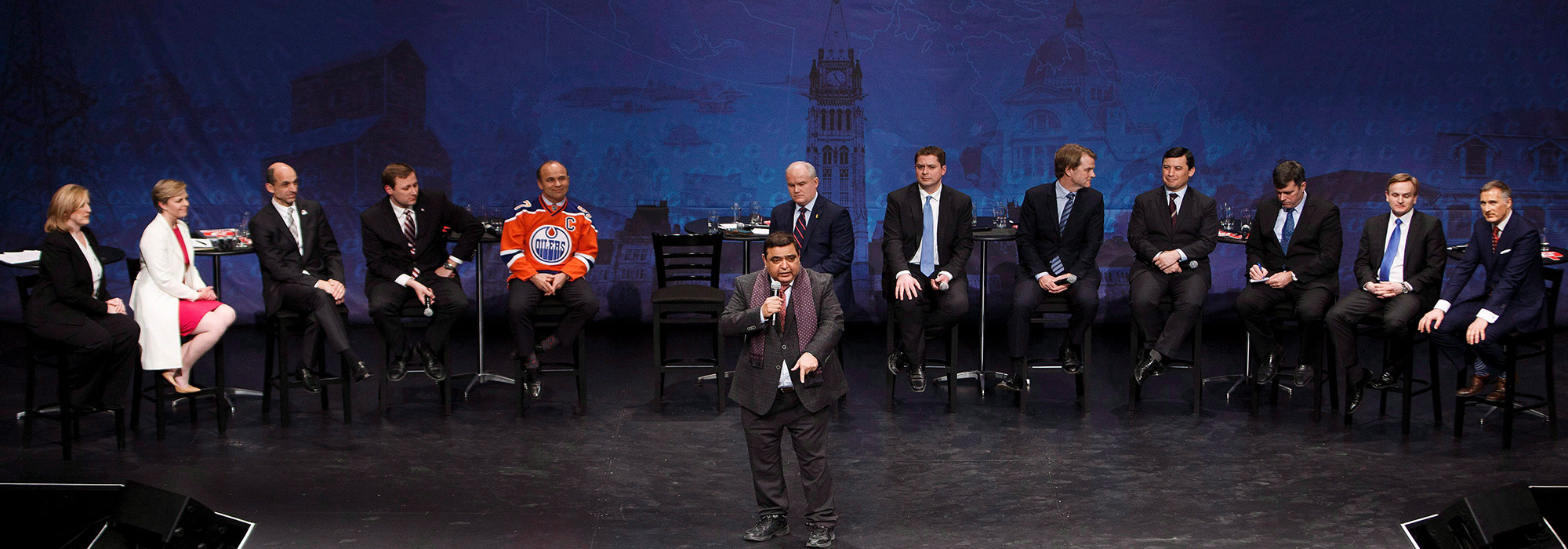
What are the options for conservatives who oppose the leadership candidates of the Conservative Party of Canada? If your party abandons conservative principles and swerves off the right-hand side of the political spectrum, where can you turn?
This is a discussion that needs to happen in Canadian conservative politics. Journalist Scott Gilmore, a “self-loathing Tory,” began the conversation with a column that threw down a gauntlet to politicos. He has received an overwhelming amount of feedback and is organizing a cross-country tour to continue the discussion with grassroots conservatives. However, several Conservative MPs made public comments criticizing this initiative, even hitting below the belt by questioning his motives because he is married to a Liberal cabinet minister. I do not know Gilmore, but I support this conversation. The Conservative Party of Canada’s leadership race proves there is space on the political spectrum for a new, “true blue” conservative party.
Many Canadians, myself included, can be called “small-c” conservatives. We believe in fiscal responsibility: governments should run with balanced budgets. We believe in individual liberty: governments should not overly interfere in citizens’ lives (by telling people whom they may or may not marry, for instance). Small-c conservatives believe in limiting, but not eliminating, government intervention in the lives of Canadians. When the government has to step in, we believe that people in need should be given a hand up, not a hand out. These are all, generally speaking, fundamental tenets for a conservative movement.
However, in Canada’s current political climate, many conservatives have a hard time finding a place to call home. In the current Conservative Party of Canada, almost all leadership contenders openly support non-conservative policies, openly criticizing LGBT Canadians and actively opposing their rights. It remains to be seen how much support these candidates will be able to muster during the final tally. However, the very fact that they have enough support to raise money, sell memberships and tour the country pushing government intervention in Canadians’ personal lives is troubling enough. It’s not just the fringe candidates who deserve criticism (such as Brad Trost). Consider the most current LGBT issue in Parliament: protecting transgender Canadians from discrimination. On October 18, 2016, some of the more prominent leadership candidates — Andrew Scheer, Erin O’Toole and Kellie Leitch — either skipped the vote or opposed a bill protecting transgender Canadians. In 2012, when the same issue had come up for a vote (I helped lobby in favour of the measure), only 15 Conservative MPs stood in support while Maxime Bernier skipped out. The proper choices on LGBT rights should be obvious. Why would a conservative encourage government intervention to restrict the civil rights of two women, or two men, who want to legally recognize their relationship? What conservative would want a government role in deciding what pronouns people can use to identify themselves, or what bathrooms people use? The answer is simple: a so-called social conservative is not a true blue conservative.
Some elements in the Conservative Party of Canada favour ideologies that actually conflict with conservative principles.
Which brings up another point: instead of tolerating or, in some cases, pandering to the ignorance in some of the populist trends, political leadership needs to inspire careful consideration. Some elements in the Conservative Party of Canada favour ideologies that actually conflict with conservative principles. Small-c conservatives believe that citizens should be granted protection from harm by their governments. Part of recognizing the importance of individual liberties is also protecting those liberties. When the Liberal government recently introduced a nonbinding motion condemning Islamophobia, Conservatives should have been able to recognize its purpose of protecting a group of citizens from harm and recent religious violence. Instead, the supposed future leaders of the Conservative Party fell into the very visible partisan trap. Several of the candidates, tripping over each other, attempted to pander to populist impulses for short-term political gain, instead of taking the time to provide thoughtful leadership and assurances to party members. By using the pretense of protecting free speech, most Conservative Party leadership candidates failed to demonstrate real leadership against the negative influences of populism. What kind of conservative would want the government to sit silently by while religious Canadians face attacks because of their faith? Not a conservative who is true to real conservative principles.
When we allow homophobes, racists and others to push their non-conservative platforms onto the rest of the party…we do damage to true blue conservative policies.
Social conservatives and other fringe groups often claim to be defending free speech when they argue in favour of their non-conservative objectives. By using free speech as an excuse themselves, Conservative leadership candidates give political cover to those Canadians who actively seek to undermine the principles of individual liberty and freedom of religion. But the true conservative approach, the one that removes government intervention in the lives of individual Canadians, is easy to recognize. If a Canadian wants to get married, why would the government intervene? If religious Canadians want reassurance that their freedom of religion is supported by the government, why would a conservative politician not support a motion opposing fear based on religion? Free speech is not a factor in any of these issues. However, when we allow homophobes, racists and others to push their non-conservative platforms onto the rest of the party, under the guise of free speech and in the name of a “big tent” political party, we do damage to true blue conservative policies. We can support free speech and still want nothing to do with these policies. Fear of anyone based on their religion, sexuality or place of birth is not a conservative principle.
Leadership is more than having your name in lights, and more than sitting in the big chair at the head table. Leadership is a responsibility to represent the best in us, but good leadership should also encourage us to better ourselves. A true leader will be able to make Canadians sit back, carefully consider an issue and come to an educated conclusion. A conservative leader who campaigns in ways that are true to conservative policy and then governs without being divisive will have my proud support. But if the future leader of the Conservative Party of Canada whips up populist impulses and panders to only some elements of the party instead of explaining and representing a conservative vision, I will move on to another party. Many conservative Canadians will need a new home.
Critics will claim we must not split the right again. Their point misses the mark. The current Conservative Party of Canada and most of its leadership candidates tainted the perception of actual conservative ideology in Canada. They took a philosophy of balanced budgets, individual liberty and responsibility and twisted it into a divisive and non-conservative brand. The Conservative Party of Canada accumulated a considerable amount of negative baggage in a very short time. Maybe it is time for a new party; maybe it isn’t. Either way, it is time to have a conversation about what real conservative policies look like. A true blue conservative party with leadership that inspires instead of divides, and with policy that promotes fair taxation, fiscal responsibility and individual liberties, will succeed. A Conservative Party with anti-gay, anti-immigrant, anti-environment tendencies will fail.
Photo: Deepak Obhrai speaks during the Conservative leadership debate at the Maclab Theatre in Edmonton, Alta., on Tuesday, Feb. 28, 2017. THE CANADIAN PRESS/Codie McLachlan
Do you have something to say about the article you just read? Be part of the Policy Options discussion, and send in your own submission. Here is a link on how to do it. | Souhaitez-vous réagir à cet article ? Joignez-vous aux débats d’Options politiques et soumettez-nous votre texte en suivant ces directives.









